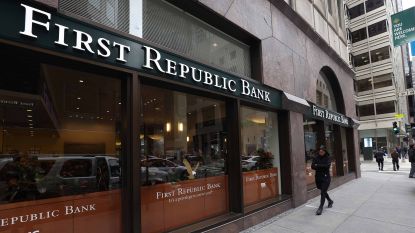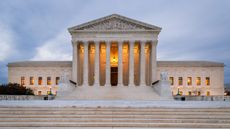Deeper Regional Banking Crisis Unlikely after Triple Failure: Kiplinger Economic Forecasts
Lending could still contract, while financial regulators want more oversight of non-banks.
- (opens in new tab)
- (opens in new tab)
- (opens in new tab)
- Newsletter sign up Newsletter

Our highly experienced Kiplinger Letter team produces regular forecasts on the banking and finance sectors to help you make better decisions about your investment and personal finances (Get a free issue of The Kiplinger Letter or subscribe.) You will always get them first by subscribing, but we will publish many (but not all) of the forecasts a few days afterward online. Here’s the latest forecast…
The failure of First Republic Bank has once again sparked concerns about the U.S. financial system. Bank regulators have taken control of First Republic and sold most of its operations to JPMorgan Chase & Co (JPM (opens in new tab)).
This marks the third failure of a large regional bank since mid-March. There are some parallels between First Republic and Silicon Valley Bank, both of which catered to high-net-worth individuals and had an unusually high share of deposits above the $250,000 Federal Deposit Insurance Corporation (FDIC) limit.

Sign up for Kiplinger’s Free E-Newsletters
Profit and prosper with the best of expert advice on investing, taxes, retirement, personal finance and more - straight to your e-mail.
Profit and prosper with the best of expert advice - straight to your e-mail.
As a result, many depositors moved their funds to larger banks when turmoil hit this spring. A crisis among regional banks still seems unlikely.
What’s next for the banking sector?
While headwinds will continue to plague the industry, vulnerability to rising interest rates varies greatly by bank. Those most at risk: Banks that benefited from a flood of customer deposits during the pandemic and used it to provide cheap mortgages to wealthy customers or buy long-term bonds. But no matter what, bank lending will contract, another source of drag on U.S. economic growth this year.
Financial regulators want to toughen oversight of nonbanks. The FSOC (opens in new tab) (Financial Stability Oversight Council) has announced a series of proposals to strengthen the process by which investment managers, insurers, hedge funds and other nonbank financial firms are designated as systemically important. For now, the label, which allows for extra oversight, applies only to the nation’s largest banks.
What rules could change?
A few Trump-era changes would be reversed, specifically, 2019 requirements that forced regulators to wait several years before designating a particular institution as systemically important. The new rules introduce a variety of metrics for regulators to determine whether a company’s distress could threaten U.S. financial stability.
Nonbank financial companies are opposed, arguing the rules should focus on specific activities rather than companies. Three large insurers — AIG, MetLife (MET (opens in new tab)) and Prudential — plus GE Capital (GE (opens in new tab)) were initially considered systemically important after the 2008 financial crisis. All four have since been freed from that status.
This forecast first appeared in the The Kiplinger Letter. Since 1925, the Letter has helped millions of business executives and investors profit by providing reliable forecasts on business and the economy, as well as what to expect from Washington. Get a free issue of The Kiplinger Letter or subscribe.
Rodrigo Sermeño covers the financial services, housing, small business, and cryptocurrency industries for The Kiplinger Letter. Before joining Kiplinger in 2014, he worked for several think tanks and non-profit organizations in Washington, D.C., including the New America Foundation, the Streit Council, and the Arca Foundation. Rodrigo graduated from George Mason University with a bachelor's degree in international affairs. He also holds a master's in public policy from George Mason University's Schar School of Policy and Government.
-
-
 Courts to Rule on Agency Powers: Kiplinger Economic Forecasts
Courts to Rule on Agency Powers: Kiplinger Economic ForecastsEconomic Forecasts The scope of agency power is under the spotlight in cases in the Supreme and Federal Courts: Kiplinger Economic Forecasts
By Letter Editors • Published
-
 Spending Cuts Could Trigger Deeper Slowdown: Kiplinger Economic Forecasts
Spending Cuts Could Trigger Deeper Slowdown: Kiplinger Economic ForecastsEconomic Forecasts Spending Cuts Could Trigger Deeper Slowdown: Kiplinger Economic Forecasts
By David Payne • Published
-
 Courts to Rule on Agency Powers: Kiplinger Economic Forecasts
Courts to Rule on Agency Powers: Kiplinger Economic ForecastsEconomic Forecasts The scope of agency power is under the spotlight in cases in the Supreme and Federal Courts: Kiplinger Economic Forecasts
By Letter Editors • Published
-
 Spending Cuts Could Trigger Deeper Slowdown: Kiplinger Economic Forecasts
Spending Cuts Could Trigger Deeper Slowdown: Kiplinger Economic ForecastsEconomic Forecasts Spending Cuts Could Trigger Deeper Slowdown: Kiplinger Economic Forecasts
By David Payne • Published
-
 Travel Demand and Delays to Soar, So Plan Ahead: Kiplinger Economic Forecasts
Travel Demand and Delays to Soar, So Plan Ahead: Kiplinger Economic ForecastsEconomic Forecasts Travel Demand and Delays to Soar, So Plan Ahead: Kiplinger Economic Forecasts
By Sean Lengell • Published
-
 SpaceX in Good Shape Despite Test Flight: Kiplinger Economic Forecasts
SpaceX in Good Shape Despite Test Flight: Kiplinger Economic ForecastsEconomic Forecasts SpaceX in good shape despite test flight concerns: Kiplinger Economic Forecasts.
By John Miley • Published
-
 Medicare Drug Price Negotiations Latest: Kiplinger Economic Forecasts
Medicare Drug Price Negotiations Latest: Kiplinger Economic ForecastsEconomic Forecasts Medicare drug price negotiations: Early signs have emerged of how these key talks will be handled.
By Matthew Housiaux • Published
-
 TikTok Ban Winners and Social Media Changes: Kiplinger Economic Forecasts
TikTok Ban Winners and Social Media Changes: Kiplinger Economic ForecastsEconomic Forecasts TikTok Ban winners, LinkedIn changes: Kiplinger's analysis of the massive social media cross-platform shake-ups.
By Letter Editors • Published
-
 Debt Ceiling Will Be Averted but It Won’t Be Easy: Kiplinger Economic Forecasts
Debt Ceiling Will Be Averted but It Won’t Be Easy: Kiplinger Economic ForecastsEconomic Forecasts Debt Ceiling Will Be Averted but It Won’t Be Easy: Kiplinger Economic Forecasts
By Sean Lengell • Published
-
 China to Benefit from U.S. Semiconductor Export Controls: Kiplinger Economic Forecasts
China to Benefit from U.S. Semiconductor Export Controls: Kiplinger Economic ForecastsEconomic Forecasts Washington wants to limit the use of more advanced tech overseas, which could fuel Beijing’s lower-tech sector
By Andrew Tanzer • Published







